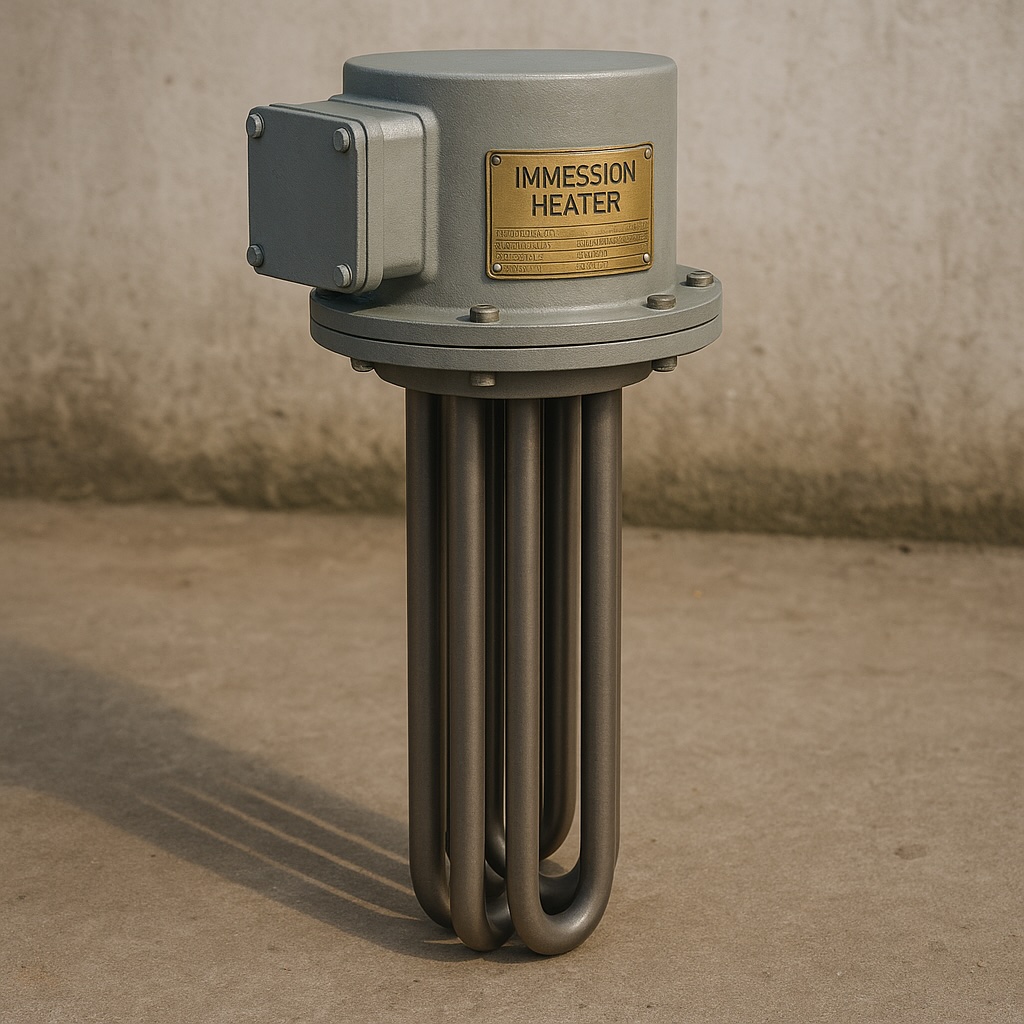 In industrial facilities, the ability to maintain stable process temperatures is a key factor in efficiency, safety, and product quality. Industrial immersion heaters play a critical role in achieving this by directly transferring heat to liquids or gases, ensuring reliable and consistent temperature control. They are widely used across sectors such as oil and gas, chemicals, pharmaceuticals, food and beverage, and energy production. By offering tailored solutions, they help industries optimize heating performance while lowering energy consumption.
In industrial facilities, the ability to maintain stable process temperatures is a key factor in efficiency, safety, and product quality. Industrial immersion heaters play a critical role in achieving this by directly transferring heat to liquids or gases, ensuring reliable and consistent temperature control. They are widely used across sectors such as oil and gas, chemicals, pharmaceuticals, food and beverage, and energy production. By offering tailored solutions, they help industries optimize heating performance while lowering energy consumption.
Unlike traditional heating systems, immersion heaters are immersed directly into tanks, pipes, or reservoirs, which allows for rapid and effective thermal transfer. Their design flexibility means they can be configured as flanged, screw-type, tubular, or fully custom units to suit unique applications. Combined with advanced control systems, these devices not only provide precise heating but also ensure operational safety. Ignis Trace stands out in the field by offering engineering-driven, high-quality heating solutions that meet international standards and deliver long-term reliability.
What is an Industrial Immersion Heater?
An industrial immersion heater is a specialized device designed to directly heat liquids or gases within a tank, vessel, or pipe system. These heaters are submerged into the medium, allowing efficient transfer of energy without significant losses. They are powered by electricity and built from durable materials such as stainless steel, carbon steel, or nickel alloys to withstand challenging environments. By maintaining stable temperatures, they ensure processes operate safely and consistently. From preventing fluid freezing to maintaining the right viscosity of oils, these heaters support critical industrial applications.
Unlike other industrial heaters, immersion models are particularly efficient because they apply heat directly where it is needed. This direct approach reduces heat-up time, minimizes energy consumption, and provides better control over process conditions. They can also be equipped with sensors and thermostats for precise monitoring. Their versatility makes them suitable for a wide variety of industries, from chemical plants to power stations. As a result, industrial immersion heaters have become a preferred choice for companies aiming to achieve both performance and energy efficiency.
What Do Instrument Protection Solutions Do?
Instrument protection solutions are designed to safeguard sensitive devices from environmental and process-related risks. They help prevent damage caused by temperature fluctuations, moisture, or corrosion. These solutions extend the service life of critical measurement tools like sensors and gauges. When combined with industrial immersion heaters, they ensure instruments operate in stable conditions. They reduce costly downtime by maintaining consistent performance. Accurate readings are preserved even in demanding environments. Protection systems also minimize maintenance requirements. They play an essential role in preserving process safety. By securing instruments, they help facilities avoid unexpected failures.
What Are the Types of Industrial Immersion Heaters?
Industrial immersion heaters are manufactured in different types to suit the diverse needs of various industries. Each design offers specific advantages depending on the medium being heated, the operating conditions, and the installation requirements. The most common types include flanged, screw-type, pipe-type (tube), and custom-designed immersion heaters. Flanged models are often used in high-pressure tanks, while screw-type heaters are preferred for smaller systems. Pipe-type heaters fit compact spaces, and custom designs address unique process challenges.
These categories provide flexibility for engineers to select the best option for each application. Material choice, power rating, and safety features vary between types, ensuring optimal performance in different environments. Some are built for aggressive chemicals, while others are designed for food-grade processes. By offering such variety, immersion heaters can cover both general-purpose and highly specialized needs.
Flanged Immersion Heaters
Flanged immersion heaters are robust heating solutions designed for large tanks and pressurized vessels. They are mounted directly through a flange connection, ensuring a secure and leak-free installation. Their design makes them suitable for heavy-duty industrial use. They provide high power output for rapid heating. Flanged heaters are versatile and can be customized with various materials. They are often used in petrochemical and water treatment industries. These heaters deliver reliable performance under demanding conditions. Industrial heaters like these can also be integrated with thermostats for precise control. They are easy to replace during maintenance cycles. Their durability and adaptability make them a preferred choice for critical industrial processes.
Screw-Type Immersion Heaters
Screw-type immersion heaters are compact heating devices designed for smaller tanks and containers. They are installed directly through threaded fittings, making them easy to mount and remove. These heaters are ideal for localized heating applications. They provide reliable heat transfer in limited spaces. Their simple design allows for quick installation. Industrial immersion heaters of this type are often used for water, oils, and light chemicals. They offer energy efficiency while maintaining process stability. Maintenance is straightforward and cost-effective. Their adaptability makes them popular in both small-scale and large-scale industries. They are a practical choice where space and efficiency are priorities.
Pipe-Type (Tube) Immersion Heaters
Pipe-type immersion heaters are designed for applications where space is limited but efficient heating is required. They are compact and fit directly into pipelines or small tanks. Their tubular design provides effective heat transfer. These heaters are often used in laboratories and small-scale processes. Their versatility makes them highly adaptable. Industrial heaters like these ensure precise temperature regulation. They are durable and reliable in continuous operation. Maintenance is simple due to their accessible design. They provide quick heating with minimal energy loss. Their efficiency and space-saving form make them valuable in specialized applications.
Custom-Designed Immersion Heaters
Custom-designed immersion heaters are created to meet specific process requirements where standard models are not sufficient. They are tailored for unique applications, considering power ratings, materials, and safety needs. These heaters can handle aggressive chemicals or extreme pressures. Their engineering ensures reliable performance in complex environments. Industrial immersion heaters of this type provide maximum flexibility. They integrate seamlessly with automation systems. Their custom design improves efficiency and safety. Maintenance requirements are minimized through optimized construction. They are ideal for industries with strict standards.
Advantages of Industrial Immersion Heaters
One of the key benefits of immersion heaters is their ability to deliver efficient and direct heat transfer. Because the heating element is placed directly into the liquid or gas, there is minimal energy loss. This leads to faster heating times and improved process reliability. These systems also provide flexibility, as they can be designed in flanged, screw-type, or tubular forms. The durability of materials such as stainless steel and special alloys ensures long service life in demanding conditions.
Unlike many other industrial heaters, immersion models are easy to install and maintain. They can be equipped with thermostats, sensors, and safety switches to provide precise temperature control. Their compact size makes them suitable even for limited spaces. The versatility of design means they can be applied in multiple industries. By reducing downtime and energy consumption, they lower overall operational costs.
Applications of Industrial Immersion Heaters
Industrial immersion heaters are used across a wide range of sectors where precise and reliable heating is essential. They are commonly found in oil and gas facilities, where they maintain fluid viscosity and prevent freezing in pipelines. In the chemical industry, they provide stable conditions for reactions and storage. Pharmaceutical plants use them to ensure consistent process temperatures for sensitive products. The food and beverage industry relies on them for pasteurization, sterilization, and maintaining liquid consistency. In energy and power plants, immersion heaters play a vital role in heating oils, water, and other critical fluids.
Their adaptability is one of their strongest advantages. These heaters can be customized to suit aggressive chemicals, hygienic environments, or high-pressure systems. With the right material selection and design, they are able to meet the requirements of even the most demanding applications. By ensuring stable temperatures, they help improve product quality, reduce waste, and maintain safety
Use of Immersion Heaters in the Oil and Gas Industry
In the oil and gas industry, immersion heaters are essential for managing fluids under harsh conditions. They maintain the viscosity of crude oil, ensuring it can be pumped efficiently. They prevent freezing in pipelines during cold climates. Storage tanks benefit from stable temperatures. These heaters also support refining processes. Industrial heaters like these ensure reliable operations in remote environments. They reduce downtime by keeping processes stable. Their robust design withstands high pressure and corrosive media. Safety is enhanced through explosion-proof configurations.
Use of Immersion Heaters in the Chemical and Pharmaceutical Industry
The chemical and pharmaceutical industries demand precise temperature control for safe and efficient processes. Industrial immersion heaters provide reliable heating for reactors, tanks, and storage vessels. They ensure that reactions occur under controlled conditions. Corrosion-resistant materials make them suitable for aggressive chemicals. They maintain consistent product quality. In pharmaceutical production, they support sterilization and formulation processes. Their design minimizes contamination risks. Automation integration enhances accuracy. Energy efficiency reduces costs.
Use of Immersion Heaters in the Food and Beverage Industry
The food and beverage industry requires hygienic and reliable heating solutions. Immersion heaters are widely used for pasteurization, sterilization, and cooking processes. They maintain stable temperatures in tanks and pipelines. Stainless steel construction ensures compliance with food safety standards. Homogeneous heating preserves product quality. Industrial heaters like these support continuous production. They reduce energy consumption while improving efficiency. Their design minimizes contamination risks. Maintenance is simple and cost-effective.
Use of Immersion Heaters in Energy and Power Plants
Energy and power plants rely on immersion heaters to maintain reliable operations. They heat water, steam, and oils used in turbines and boilers. Their efficiency ensures consistent performance. They prevent freezing in auxiliary systems. Viscosity control of lubricants is another benefit. Industrial immersion heaters withstand high pressure and temperature conditions. They integrate with automation for precision. Their durability reduces downtime. Maintenance is simplified for continuous operation.
Maintenance and Inspection Processes for Industrial Immersion Heaters
Proper maintenance is essential for ensuring immersion heaters deliver long-term performance. Regular cleaning of heating elements prevents scale buildup and residue, which can otherwise reduce efficiency. Electrical connections should be inspected to ensure they remain secure and safe. Sensors and thermostats require periodic calibration for accuracy. These steps improve both safety and energy efficiency. Maintenance schedules should align with process demands to reduce downtime.
Compared to other industrial heaters, immersion models have simpler maintenance needs, but regular inspections remain vital. Protective devices such as thermal cutoffs must be tested to avoid overheating. Monitoring surface conditions helps detect wear or corrosion early. Preventive care extends the service life of the heaters. Ignis Trace supports facilities with professional maintenance guidelines, ensuring uninterrupted and reliable heating for critical operations.
Considerations When Selecting Industrial Immersion Heaters
Choosing the right immersion heater requires evaluating the process requirements and operating conditions carefully. The type of fluid or gas to be heated, its viscosity, and its chemical composition all influence the correct material choice. Stainless steel, carbon steel, and nickel alloys are common options depending on corrosion resistance needs. The desired temperature range and heating capacity are also critical factors. Installation requirements, such as flanged, screw-type, or tubular designs, should be matched with the facility’s infrastructure.
Beyond technical specifications, safety and efficiency must be priorities. Control features like thermostats, sensors, and overload protection improve reliability. Energy efficiency considerations help reduce operating costs in the long run. Industrial immersion heaters designed for aggressive environments or food-grade applications may require special certifications. Maintenance accessibility should also guide the selection process. Ignis Trace provides expert engineering consultation, ensuring customers choose the best solution for their unique industrial needs.
Standards and Certifications for Industrial Immersion Heaters
To guarantee safety and reliability, immersion heaters must comply with international standards and certifications. Manufacturing processes follow strict guidelines to ensure product consistency and performance. CE and ISO certifications are commonly required across industries, while ATEX certification is critical for heaters used in explosive environments. In addition, compliance with EN standards ensures suitability for pressurized applications. Certified heaters deliver peace of mind for operators by meeting regulatory demands.
Compared to other industrial heaters, immersion models often undergo rigorous testing to confirm durability and safety. In sectors such as food, pharmaceutical, and energy, specific certifications may be needed for hygienic or high-risk applications. Certification also assures long service life and compatibility with global markets.

 Türkçe
Türkçe



